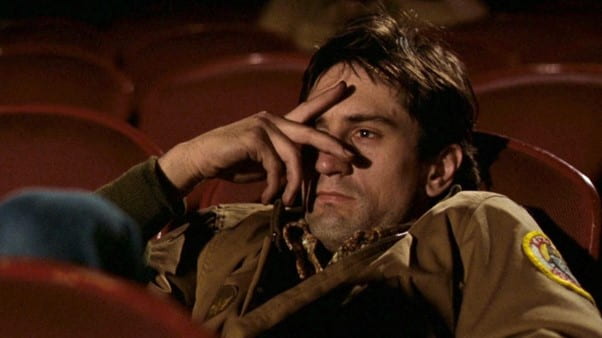By Elena Hijazi | Junior Editor of Books & Literature
It’s not about the journey, it’s about the destination, they say. Well, they have surely never gotten in the car with Taxi Driver’s Travis Bickle. Taxi Driver is an unrivalled mural for cinema and despite its initial release date being 48 years ago, it continues to be a film that inspires other films to this day. It offers an unparalleled, ever-giving, and munificent cinematic experience that holds timelessly, and it exudes in the viewer a feeling unmatched to any other; one beyond the five senses. It is existentialist and misleading, fooling the viewer into thinking to themselves “oh, I know this person”, “I understand his loneliness.”, and “I am rooting for him”, until this person turns from a friend to a foe, scene by scene.
To begin with, Robert De Niro, the star of the film, both on-screen and off, was debating a contract with director Martin Scorsese on Taxi Driver, in which they agreed De Niro to be paid 35,000$ (I know, haram, poor thing.) After the contract had not yet been confirmed and signed, De Niro won an Oscar for Best Supporting Role for The Godfather Part II. He could have easily asked for 10 times this price, but he did not. Scorsese had not yet been a success at the time, so he would have not been able to afford him if he did that. Just like that, De Niro saved Taxi Driver through this humble act. De Niro and Scorsese had known each other all their lives, but only became friends in their early twenties. They continue to make movies together to this day, the Oscar-nominated Killers of the Flower Moon (2023) being their most recent collaborative endeavour.
Taxi Driver came about during an era of cinema referred to as “New Hollywood”. The films of this time had certain qualities to them. Most significantly was their portrayal of more complex anti-heroes as protagonists and their realistic grungy environments. These elements are poignantly found here. The film is simply about the mental breakdown of an isolated young man driving a cab through the streets of ‘70s New York. This is what makes the film most engaging to audiences. A man, with all his virtues and vices, will have you embarrassingly relating to him and rooting against him simultaneously. He seems like someone you could run into on the streets, or better yet, someone that could drive you around those streets, and he is full of contradictions and nuances that pierce your eyes on the screen. We want to watch characters that fluster us and shake our moral codes like Taxi Driver’s Travis Bickle does.
The most memorable films do not have the most complex plots (think Jaws or Citizen Kane), and the same is fair to say here. What makes them so enticing is how they’re made and their detailed idiosyncratic storytelling. This film explores loneliness as a major theme, portraying Travis as a solitary figure known as “God’s lonely man.” Despite being in a bustling city like New York, Travis remains separate from his surroundings, unable to conform to his environment. The cinematographer skilfully utilizes camera framing and movement to reflect Travis’s mood, desires, and perspective. The goal is to visually portray a man who is thoroughly disgusted by his surroundings, and this is done triumphantly.
The interesting thing about Travis Bickle, is his relatable normalcy. Not only could he be a stranger, an acquaintance, a friend, no, he could be YOU. His loneliness is palpable in the heart, he has a normal job, and he’s a bit awkward. This is why we feel both deceived and existentially frightened when he reveals his psychopathic nature towards the end of the movie. You are left wondering what people are capable of. You are left wondering what you are capable of. This is reminiscent of Alfred Hitchcock’s Psycho as well. Normal Norman Bates turns out to be a psycho. Except Taxi Driver does not intend to be a horror film, which makes it even more bone-chilling and bewildering.
Taxi Driver is undoubtedly the film that made me look at films differently. I would not be writing about films if I did not stumble upon it. How could one forget the infamously improvised “you talkin’ to me?” scene. This film is timeless and incomparable, the Hollywood legend that will never grow old. This is my take on Taxi Driver, I bestow it upon you with an open mind and heart. Thank you for taking the time to read this.


Your article content is being very much interested, I am very impressed with your post. I hope to receive more great posts KMFusa
Excellent content… You’ve made some excellent observations.
Will share this with others
Visit my web site sports betting
Thanks for any other informative blog. Where else may I am getting that kind of info written in such an ideal method? I have a project that I am simply now running on, and I’ve been on the glance out for such information. rentacarkosova http://www.5starsstocks.com/
This article is really amazing i hope we will see again this type of article in future.. mymilestonecard
Great article. Your perspective is refreshing.
Looking forward to more
Also visit my web page … google